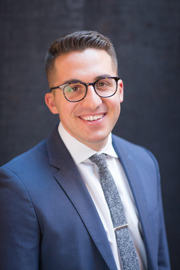
Kehilah (community) can be a powerful force. Communities exist around religion, common interests, race, advocacy, gender identity and politics, to name a few. Community has strengthened my faith, validated and supported my identity, and helped me to become a better human being.
At the start of this month, I visited Kansas City to attend KCPrideFest, a three-day event uniting and celebrating the local LGBTQ community. I came out as gay my senior year of high school at the Hyman Brand Hebrew Academy, then left Kansas City a few months later. Most of my life as an out gay man has been lived in college and in my current home in Washington, D.C., so I was particularly excited to come back to the place where I grew up to experience something I never had before, the local LGBTQ community.
For those who have not been to Pride, it is similar to the Jewish Arts Festival. There are musical performances, food stalls and tents with booths featuring the work of different organizations, vendors and companies. Local nonprofits and faith groups filled these tents, showing the resources and safe spaces they provide for LGBTQ people. But as my brother and I walked up and down the rows of organizations, noticeably absent was our kehilah, our Jewish community.
Many area Methodist, Presbyterian, Buddhist and Atheist groups proudly stood at Pride and demonstrated to the thousands of festival-goers that there was a place in their faith communities for those in attendance. But not a single Jewish organization was present. No synagogue, social action group, preschool, religious school or Jewish community organization was represented. Jews such as myself did not see my kehillah anywhere. But perhaps more significantly, people who weren’t Jewish got the impression that the Jewish community does not stand with the LGBTQ community in Kansas City.
I do want to mention that Rabbi Alpert took part in two other Pride events. He was the keynote speaker at a Pride service held at Children’s Mercy Hospital, marking the 50th anniversary of the Stonewall Uprising. He also spoke at an interfaith service at Community Christian Church. His presence and active role in these events are significant.
Visibility matters. Visibility is what pride is all about. As my brother and I were walking around, someone stopped us with a gasp and asked, “Wow, is that a rainbow kippah?” They were so excited, greeting us with ‘shalom,’ as we exchanged smiles and continued on our way. The surprise in their voice inspired me to write this article. Imagine how excited they would have been to see a banner with the name of a synagogue or Jewish organization? How many more people did not see my brother’s kippah and left not knowing that there are Queer Jews or Jewish allies or a local Jewish community? Visibility DOES matter.
So many in my generation turn away from Jewish institutions because they do not feel like welcoming places. I see it with many of my friends. For a time, I felt that way too, until I moved to Washington, D.C. The Conservative synagogue I attend is very inclusive, from their programming and religious practices to their gender inclusive bathrooms throughout the shul. The JCC has a designated LGBTQ programming wing, and I’m proud to serve on the board of this group I have been involved in for years. At the D.C. Pride Festival, more than a dozen local Jewish organizations and synagogues are represented. That is the kind of kehillah that allows me to feel fully immersed and accepted in my Jewish community and allows my peers to feel like the Jewish community shares their values. Are Jews my age in Kansas City feeling welcome in the same way?
Someday, I hope to return to Kansas City and start a family. But I want to do so in a place that I, and other gay, lesbian, bisexual, transgender and queer people know that the Jewish community is actively welcoming us.
I urge the Kansas City Jewish community, the community that raised me to love my Judaism, to step up and step out. Learn from local churches about the ways they bring inclusion into their houses of worship. Initiate LGBTQ family programming in your communal organizations. Create more visibly welcoming spaces in your religious schools, preschools and day school. Show the Kansas City community that the Jewish community is an active ally that values inclusion as one of its most important Jewish values
Jonathan Edelman is pursuing his master’s in museum studies at The George Washington University, after spending two years working as a part of the curatorial team at the U.S. Holocaust Memorial Museum in Washington, D.C.


